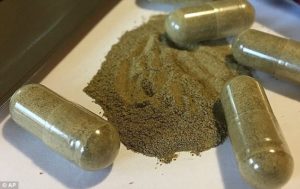What the Heck is Kratom | Hint – It’s Not a Superhero or a Planet
The mother of a Florida (where else) teen is suing a kratom tea shop because she (and her lawyers) believe that the plant alkaloid-infused tea that her daughter was served and consumed a great deal of, left her with brain damage.
According to the lawsuit, the beautiful 19-year-old, named Brette Tabar frequented several tea shops in Pinellas County and was “negligently” served enough kratom tea to create a psychotic episode earlier this year. The lawsuit stipulates the establishments failed to warn the young woman of dangerous side effects making them liable for “bodily injury and resulting pain and suffering, aggravation of a pre-existing condition, mental anguish, loss of capacity for the enjoyment of life, past and future medical and nursing care expenses and treatment.”
Sounds pretty serious.
So what the heck is this kratom stuff and can it really cause “frontal lobe damage” as described in the lawsuit?
Ok – kratom is derived from a plant that grows in Southeast Asia, the mitragyna speciosa, which is related to the tropical evergreens that produce coffee beans. Kratom seeds, plants and extracts can be purchased online or in specialty paraphernalia shops.
Kratom has interesting pharmacological activity – is usually brewed like a tea, or crushed into a powder and mixed with water. The powder is also packaged into capsules.
Farmers and indigenous people have used kratom teas and slurries for hundreds of years to increase work efficiency because low doses act as a mild stimulant. At higher doses, it can cause sedation and that’s probably where the young lady in the lawsuit (and the other 44 deaths associated with kratom) got into problems.
The Food and Drug Administration has not identified any utility for kratom and the agency has called for more research into the substance, while warning consumers “not to use any products labeled as containing the botanical substance kratom or its psychoactive compounds, mitragynine and 7-hydroxmitragynine.” Research demonstrates that mitragyna speciosa extracts possess antinociceptive (analgesic), anti-inflammatory, anti-depressant, and muscle relaxant properties. Available evidence further supports the adverse effects of mitragyna speciosa preparations, mitragynine on cognition. Pharmacological activities are mainly mediated via opioid receptors as well as neuronal Ca2+ channels (which also control many basic cellular functions, like mitochondrial respiration).
1-s2.0-S0361923016300582-mainSo yes – the active ingredient in kratom, mitragynine, has ADVERSE effects on cognition, meaning it makes you STUPID.
Because mitragynine affects (and has adverse affects) on opioid receptors, it has been touted as a possible adjunct for opioid (narcotic) addiction and withdrawal. Some research is looking at kratom as a new type of pain killer – Trevena Pharmaceuticals (a Pennsylvania-based pharmaceutical company) has received preferential regulatory treatment by the FDA for oliceridine, a mitragynine pseudoindoxyl compound derived from the kratom plant. Olicerideine has shown less incidence of addiction in mice.
Kratom is illegal in Alabama, Arkansas, Indiana, Tennessee, Vermont, Wisconsin and the District of Columbia. Denver, San Diego and Sarasota, Fla., have banned it, too. Six other states last year — Florida, Kentucky, New Hampshire, New Jersey, New York and North Carolina — considered kratom legislation last year. I tried to buy some kratom online but the website required me to give my BANK ACCOUNT number. Whaaaat? Why can’t I give a credit card or PayPal? Seems a lot spooky. I bailed on the website so I’ll have to buy my kratom somewhere else.
In the grand scheme of things, taking kratom in moderation seems harmless enough. That being said, given its activity at the opioid receptors, it’s probably pretty addictive. Whenever you super-concentrate something (like by brewing it into a tea), the effects are acutely accentuated.
Luckily for me, kratom is 100% legal to purchase in Pennsylvania. I know what I’m doing tomorrow.













































